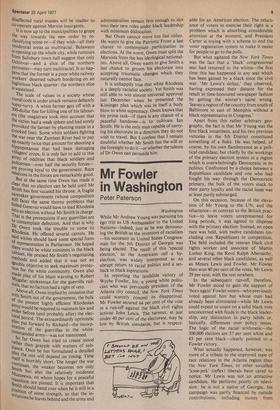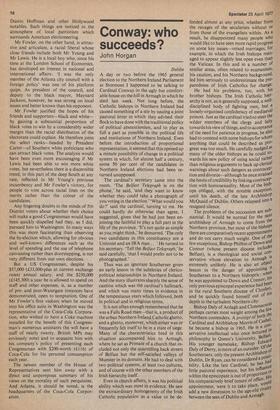Mr Fowler in Washington
Peter Paterson
Washington While Mr Andrew Young was pursuing his ego trip as US Ambassador to the United Nations—indeed, just as he was denouncing the British as the inventors of racialism —his successor as United States Congressman for the 5th District of Georgia was being elected. The result of this 'special election,' as the Americans call a byelection, was widely interpreted as an abrupt return to racial politics and a setback to black aspirations.
In reporting the landslide victory of Wyche Fowler, Jnr, a young white politician who was previously president of the Atlanta city council, the New York Times could scarcely conceal its disapproval. Mr Fowler secured 64 per cent of the vote in a run-off against the black civil rights activist John Lewis. The turnout, at just under 40 per cent of the electorate, may be low by British standards, but is respect
able for an American election. The reluctance of voters to exercise their right is a problem which is absorbing considerable attention at the moment, and President Carter is toying with a scheme to end the voter registration system to make it easier for people to go to the polls.
But what agitated the New York Times was the fact that a 'black' congressional seat had returned to the whites—the first time this has happened in any seat which has been gained by a black since the civil war. 'Mr Lewis's defeat,' they observed, having expressed their distaste for the result in time-honoured newspaper fashion by getting the winner's name wrong, 'leaves a region of the country from south of Baltimore to east of Memphis without a black representative in Congress.'
Apart from this rather arbitrary geography, the fact is that Mr Young was the first black incumbent, and his two previous victories in the 5th District constituted something of a fluke. He was helped, of course, by his own flamboyance as a political candidate, but chiefly by the workings of the primary election system in a region which is overwhelmingly Democratic in its politics. Confronted by a choice between a Republican candidate and one who had fought his way through the Democratic primary, the bulk of the voters stuck to their party loyalty and the racial issue was at least partly submerged.
On this occasion, because of the elevation of Mr Young to the UN, and the reluctance—in contrast to the British practice—to leave voters unrepresented for long periods, it was agreed to dispense with the primary election. Instead, an open race was held, with twelve candidates (including one Republican) in competition. The field included the veteran black civil rights worker and associate of Martin Luther King, the Revd Ralph Abernathy, and several other black candidates, as well as Messrs Lewis and Fowler. Mr Fowler then won 40 per cent of the votes, Mr Lewis 29 per cent, with the rest nowhere.
In the subsequent run-off, therefore, Mr Fowler stood to gain the support of 'born again' Fowler voters—who previously voted against him but whose man had already been eliminated—while Mr Lewis could expect to count on a solid black vote unconcerned with feuds in the black leadership, any distinction in party labels or, basically, differences over policy issues. The logic of the racial arithmetic—the 300,000 electors are 57 per cent white and 43 per cent black—clearly pointed to a Fowler victory.
What actually happened, however, was more of a tribute to the improved state of race relations in the Atlanta region than the New York Times, or other so-called 'knee-jerk' (reflex) liberals have cared to notice. Mr Lewis was not an attractive candidate. He performs poorly on television; he is not a native of Georgia; his campaign was partly financed by outside contributions, including money from Dustin Hoffman and other Hollywood notables. Such things are noticed in the atmosphere of local patriotism which surrounds American electioneering.
Mr Fowler, on the other hand, is attractive and articulate, a racial liberal whose close friends include both Mr Young and Mr Lewis. He is a local boy who, since his time at the London School of Economics, has developed an interest in national and international affairs: 'I was the only member of the Atlanta city council with a foreign policy' was one of his platform quips. As president of the council, and deputy to the black mayor, Maynard Jackson, however, he was strong on local issues and better known than his opponent.
Mr Fowler justified the hopes of his friends and supporters—black and white— by gaining a substantial proportion of black votes to win by a considerably wider margin than the racial distribution of the electorate could explain. He therefore joins the select ranks—headed by President Carter—of Southern white politicians who can attract black votes. The analysis would have been 'even more encouraging if Mr Lewis had been able to win more white votes, but nevertheless there is a discernible trend, in this part of the deep South at any rate, reflected in Mr Young's previous incumbency and Mr Fowler's victory, for people to vote across racial lines on the merits rather than the colour of the candidates.
Any lingering doubts in the minds of 5th District voters about whether their choice will make a good Congressman would have been quickly dispelled had they, as I did, pursued him to Washington. In many ways this was more fascinating than observing the by-election which, allowing for obvious and well-known differences such as the level of spending and the use of telephone canvassing rather than doorstepping, is not very different from our own elections.
But a US Congressman, despite his $57,000 (03,000-plus at current exchange rates) annual salary, and the $250,000 (£l45,300) a year he is allowed to spend on staff and other expenses, is, as a number of preand post-Watergate instances have demonstrated, open to temptation, One of Mr Fowler's first visitors when he moved into his office suite in Washington was the representative of the Coca-Cola Corporation, who wished to have a Coke machine installed for the benefit of this Congressman's numerous assistants (he will have a staff of nearly twenty, British MPs may enviously note) and to acquaint him with his company's policy of presenting each Congressman with $200-worth (Ell 6) of Coca-Cola for his personal consumption each year.
The newest member of the House of Representatives sent him away with a direct and unpompous summary of his views on the morality of such perquisites. And Atlanta, it should be noted, is the headquarters of the Coca-Cola Corporation.



































 Previous page
Previous page